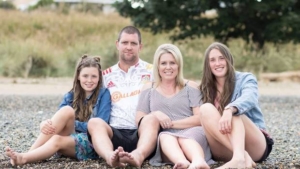31 January 2019
Father-of-two Blair Vining was told he had to wait eight weeks for an “urgent appointment” with an oncologist after being diagnosed with terminal bowel cancer.
Now, the 38-year-old has just months to live.
The Southland father says he’s been let down by the public health system that fails to hold District Health Boards to account for life-threatening wait times.
Refusing to wait until his “due date”, Vining managed to book an appointment within a week with Christchurch oncologist Chris Jackson – who is also the medical director of Cancer Society New Zealand.
Vining was able to start chemotherapy right away which gave him a further three months to live – enough time to renew his wedding vows and savour the time he had left with his two teenage daughters.
“If he hadn’t seen Chris when he did and waited that eight weeks, there’s a high chance he would already be dead,” Vining’s wife Melissa told the Herald in tears.
Public reporting of DHBs’ performance of cancer treatment wait times was axed by the Labour Government in June last year.
Health Minister David Clark said at last year’s announcement the targets created “perverse incentives” but cancer experts say people are dying because of it.
Jackson – who spoke to the Herald ahead of a two-day international cancer conference kicking off in Wellington today – said that needed to change.
“It’s ridiculous that DHBs operate separately without any national standard,” Jackson said.
Bowel Cancer NZ spokesperson Mary Bradley said this inaction from Government was “simply not good enough”.
“We know people are already experiencing unacceptable wait times and yet a workforce plan on how this will be addressed is still not forthcoming from the Ministry of Health.
People who are often symptomatic and need treatment urgently are in a desperate situation, Bradley said.
“A delayed diagnosis can be the difference between having a fighting chance to facing a terminal outcome,” Bradley said.
A Ministry of Health spokeswoman said there were still national waiting time “expectations” for cancer management, which DHBs were expected to work to.
Patients with a confirmed cancer diagnosis were expected to receive their first cancer treatment within 31 days of a decision to treat,” the spokeswoman said.
And the spokeswoman said patients referred urgently with a high suspicion of cancer receive their first treatment within 62 days of the referral being received by the hospital.
“The Ministry of Health is currently developing a new set of performance measures to improve health outcomes for New Zealanders,” the spokeswoman said.
The Vinings – who were speaking at today’s conference to share their story – stressed their anguish was not against the doctors but the system.
“After seeing Chris, we had a meeting with our local DHB doctors who had no idea how long we were having to wait.”
Melissa said the saddest thing was she thought they were the exception and had somehow slipped through the cracks of the system.
“I then shared our story on social media and were contacted by dozens of families going through the same experience.”
She said her husband’s deadly cancer couldn’t have been detected earlier because he was well below the public screening age of 60.
Part of Blair’s bucket list was to help change the system.
“People try to opt for help and can’t access that help which is just so wrong,” Melissa told the Herald.
She said their whole family’s lives had been tipped upside down.
“Our youngest daughter started writing letters to Blair because she found it hard to talk to him about it.
“In one letter she said she was living in constant fear that she would wake up and her dad wouldn’t be there and wouldn’t make her 13th or 16th birthday or be there to dance with her at her wedding.
“No child should have go through that and we want to help make change,” Melissa said.



